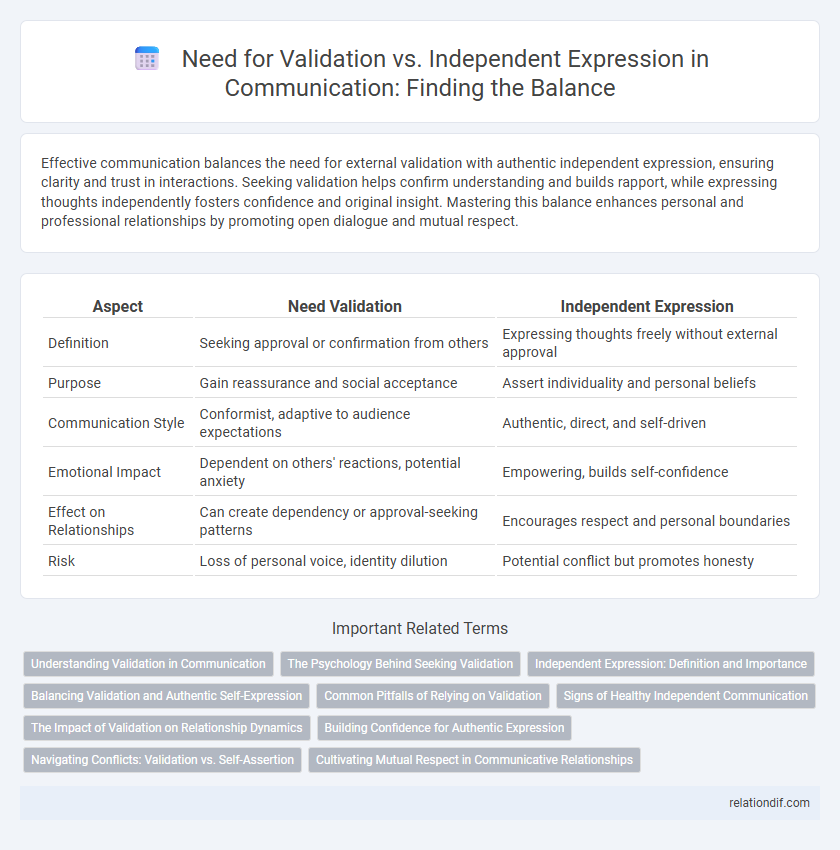Effective communication balances the need for external validation with authentic independent expression, ensuring clarity and trust in interactions. Seeking validation helps confirm understanding and builds rapport, while expressing thoughts independently fosters confidence and original insight. Mastering this balance enhances personal and professional relationships by promoting open dialogue and mutual respect.
Table of Comparison
| Aspect | Need Validation | Independent Expression |
|---|---|---|
| Definition | Seeking approval or confirmation from others | Expressing thoughts freely without external approval |
| Purpose | Gain reassurance and social acceptance | Assert individuality and personal beliefs |
| Communication Style | Conformist, adaptive to audience expectations | Authentic, direct, and self-driven |
| Emotional Impact | Dependent on others' reactions, potential anxiety | Empowering, builds self-confidence |
| Effect on Relationships | Can create dependency or approval-seeking patterns | Encourages respect and personal boundaries |
| Risk | Loss of personal voice, identity dilution | Potential conflict but promotes honesty |
Understanding Validation in Communication
Understanding validation in communication involves recognizing and affirming others' feelings and perspectives, which fosters empathy and trust. Validation does not require agreement but shows respect for the speaker's experience, enhancing connection and reducing conflicts. Balancing validation with independent expression allows clear, authentic dialogue that supports mutual understanding and emotional safety.
The Psychology Behind Seeking Validation
The psychology behind seeking validation reveals an intrinsic human desire for social acceptance and reassurance, driven by neural pathways linked to reward and self-esteem. Individuals seeking validation often rely on external feedback to shape their self-concept, which can hinder independent expression and authentic communication. Developing self-awareness and emotional resilience promotes a balance between valuing others' input and asserting personal viewpoints.
Independent Expression: Definition and Importance
Independent expression refers to the ability to convey thoughts, feelings, and ideas authentically without relying on external validation. This form of communication fosters self-confidence, creativity, and personal growth by encouraging individuals to trust their own voice. Emphasizing independent expression enhances effective dialogue and promotes a deeper understanding in interpersonal relationships.
Balancing Validation and Authentic Self-Expression
Balancing validation and authentic self-expression requires recognizing the importance of external feedback while maintaining a true sense of identity. Effective communication involves seeking constructive input without compromising personal values or unique perspectives. Cultivating this equilibrium enhances interpersonal connections and fosters genuine dialogue in both personal and professional settings.
Common Pitfalls of Relying on Validation
Relying heavily on external validation can undermine authentic communication by fostering dependence on others' approval instead of fostering independent expression. This reliance often leads to diminished self-confidence, increased anxiety, and a reluctance to share genuine thoughts or emotions, hindering personal growth and meaningful connections. Effective communication requires balancing the need for validation with self-trust to promote clarity, authenticity, and resilience in interpersonal interactions.
Signs of Healthy Independent Communication
Signs of healthy independent communication include clear self-expression, active listening, and respectful acknowledgment of differing perspectives. Individuals demonstrate confidence in sharing their thoughts while valuing the input of others without seeking constant validation. Effective communication fosters mutual understanding and supports emotional autonomy within interactions.
The Impact of Validation on Relationship Dynamics
Validation in communication fosters trust and emotional safety, significantly enhancing relationship dynamics by affirming individuals' feelings and perspectives. Lack of validation often leads to misunderstandings and emotional distance, undermining connection and collaboration between partners or team members. Emphasizing independent expression alongside validation promotes balanced interactions where authenticity and empathy coexist, strengthening bonds and mutual respect.
Building Confidence for Authentic Expression
Building confidence for authentic expression requires balancing the need for validation with independent self-awareness, allowing individuals to communicate honestly without relying solely on external approval. Cultivating internal validation enhances personal credibility and fosters genuine connections, which strengthens overall communication effectiveness. Consistent practice in self-reflection and assertive dialogue empowers people to express their true thoughts and emotions confidently.
Navigating Conflicts: Validation vs. Self-Assertion
Navigating conflicts requires balancing the need for validation with independent self-expression to foster mutual understanding and respect. Effective communication strategies emphasize listening to others' perspectives while confidently asserting personal boundaries and viewpoints. Developing this balance reduces misunderstandings and promotes constructive dialogue in both personal and professional relationships.
Cultivating Mutual Respect in Communicative Relationships
Cultivating mutual respect in communicative relationships requires balancing the need for validation with independent expression, ensuring each party feels heard without compromising authenticity. Emphasizing active listening and acknowledging diverse perspectives fosters an environment where validation supports, rather than suppresses, genuine self-expression. This dynamic creates a foundation for trust and meaningful dialogue, promoting deeper connection and understanding.
need validation vs independent expression Infographic

 relationdif.com
relationdif.com